- Date Published:
2024 - Length:
320 pages—Listening Time: 7 hrs 49 minutes - Genre:
Fiction, Historical Fiction - Setting:
around 1861, pre-Civil War; along the Mississippi River, primarily in Missouri and Arkansas - Awards:
Pulitzer Prize Winner Fiction 2025; National Book Award Winner Fiction 2024; Booker Prize Shortlist 2024; International Dublin Literary Award Shortlist 2025; Kirkus Prize Winner Fiction 2024; Audie Award Finalist Fiction Narrator 2025; Audie Award Winner Literary Fiction & Classics 2025; Los Angeles Times Book Prize Winner Audiobook 2024; Los Angeles Times Book Prize Finalist Fiction 2024; National Book Critics Circle Award Finalist Fiction 2024; The Morning News Tournament of Books Winner 2025; Aspen Words Literary Prize Shortlist 2025; British Book Awards Shortlist Fiction Book of the Year 2024;
PEN/Faulkner Award for Fiction Finalist 2025; Orwell Prize Shortlist Political Fiction 2024; Andrew Carnegie Medals for Excellence in Fiction and Nonfiction Winner Fiction 2025; Southern Book Prize Finalist Fiction 2025; Golden Poppy Book Award Winner Fiction 2025; Brooklyn Public Library Book Prize Shortlist Fiction 2024; Foyles Book of the Year Shortlist 2024; Heartland Booksellers Award Winner Fiction 2024; Internationaler Literaturpreis Shortlist 2024; Libby Book Award Winner Historical Fiction 2025; The Strand’s Favorite Books 2024; The New Yorker Best Books Fiction and Poetry 2024; Elle Editors' Favorite Books 2024; Goodreads Choice Awards Nominee Historical Fiction 2024; Booklist Editor's Choice: Adult Books Fiction 2024; NPR: Books We Love 2024; Boston Globe Best Book Fiction 2024; Booklist Editor's Choice: Adult Books Fiction 2024; NPR: Books We Love 2024; Boston Globe Best Book Fiction 2024; The New York Times Notable Books of the Year Fiction 2024; Christian Science Monitor Best Book Fiction 2024; Esquire The Best Books Fiction 2024; Washington Post Best Books Fiction 2024; The Guardian Books of the Year Fiction 2024; Globe and Mail Top 100 Book International Fiction 2024; Globe and Mail Top 100 Book International Fiction 2024; The Economist Best Books 2024; Los Angeles Public Library Best of the Year Fiction & Literature 2024; Los Angeles Times Best Books of the Year 2024; LibraryReads Monthly Pick Top Ten March 2024; Bitter Southerner Summer Reading Roundup 2024; Chicago Public Library Best of the Best: Adults 2024; Chicago Public Library Best of the Best: Adults Fiction 2024; AudioFile's Best Audiobooks of the Year Fiction 2024; King County Library System Best Books Fiction 2024; BPL Staff Picks: Best Reads of the Year 2024; Mid-Continent Public Library Best Books Adult Fiction 2024; Books Scientific American Recommends Fiction 2024; Chicago Tribune 10 of the best books 2024; The Economist Best Books 2024; Los Angeles Public Library Best of the Year Fiction & Literature 2024 - Language:
English and 6 other languages: Catalan, Dutch, German, Italian, Latin, Spanish - Sensitive Aspects:
Explicit depiction of racist violence and abuse, racially offensive language, racial stereotypes, rape, psychological toll of hopelessness, rejection of respectable politics - Movie:
A movie adaptation is in development. Universal Pictures acquired the feature film rights in 2024, with Amblin Entertainment producing and Steven Spielberg serving as executive producer. Taika Waititi was in early talks to direct. Everett himself will write the screenplay and also executive produce the film, according to reports. - Recommend for Book Club:
YES, everyone should read this book

I'm a huge fan of Percival Everett. I have read almost everything he has ever written. I listened to James right away when it came out last year. Then I told everyone—yes, everyone--(just ask all my friends)—that this book would win the next Pulitzer Prize for Fiction and possibly every other major book award for 2024. Look above at all of the accolades showered on this fantastic work. It seems I'm not the only one that loves this book. James is a must-read, ranking right up there with To Kill a Mockingbird, The Great Gatsby, and The Grapes of Wrath.
It's not like Percival Everett hasn't paid his dues as a writer. He certainly has. However, despite producing over thirty volumes—including twenty-three novels, four short-story collections, six poetry books, and a children's book—he remained relatively unknown until last year. He is a master of various genres, including crime novels, retellings of Greek myths, revisionist westerns, absurdist capers, thrillers, and farces. He defies convention in each work. For example, he might include a spoof of post-structuralist theory alongside a chilling depiction of an attack on an abortion clinic. He's also a ghetto fiction ninja, spewing merciless mockery throughout his work. When reading one of Everett's books, it's crucial to remain engaged until the very end, as he excels in crafting unexpected "final twists" that you don't see coming. He is a storyteller extraordinaire and one of the best writers of our time.
Finally, it's Everett's turn to take center stage with James. He so deserves all the attention and awards he has received. Bravo!

James by Percival Everett is a bold, inventive retelling of Mark Twain’s The Adventures of Huckleberry Finn, recasting the story from the perspective of Jim--here called James--an enslaved Black man whose quest for freedom becomes the central narrative.
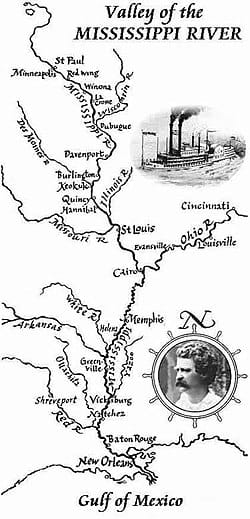
The novel opens in Hannibal, Missouri, where James, owned by Miss Watson, learns he is about to be sold, which would separate him from his wife, Lizzie, and daughter, Sadie. Determined not to be torn from his family, James escapes, setting off on a desperate journey to secure not only his own freedom but also that of his loved ones.
James is soon joined by Huckleberry Finn, a white boy fleeing his abusive father. Huck seeks adventure and escape; for James, the journey is a matter of survival and self-determination. Together, they travel down the Mississippi River, encountering a host of dangers: bandits, con artists, and the constant threat of being captured or killed. Throughout, James must navigate the perilous landscape of the antebellum South, where the law and society are arrayed against him at every turn.
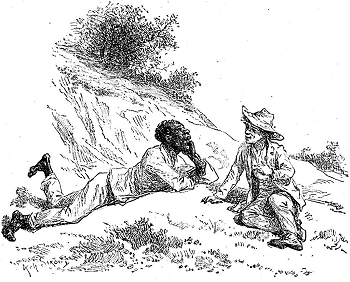
Unlike Twain’s original portrayal of Jim as naïve and secondary, Everett presents James as intelligent, literate, and deeply strategic. He performs the role expected of him by white society-speaking in “slave talk” and feigning ignorance-to protect himself while secretly nurturing his intellect and agency. This duality exposes the dehumanizing effects of slavery and the institutional racism underpinning it.
The novel is both satirical and harrowing, using wit and irony to critique the myths of American innocence and progress. Everett portrays James not as a passive victim, but as a man driven by action, wit, and profound emotion, determined to reclaim his humanity and rewrite his own story.
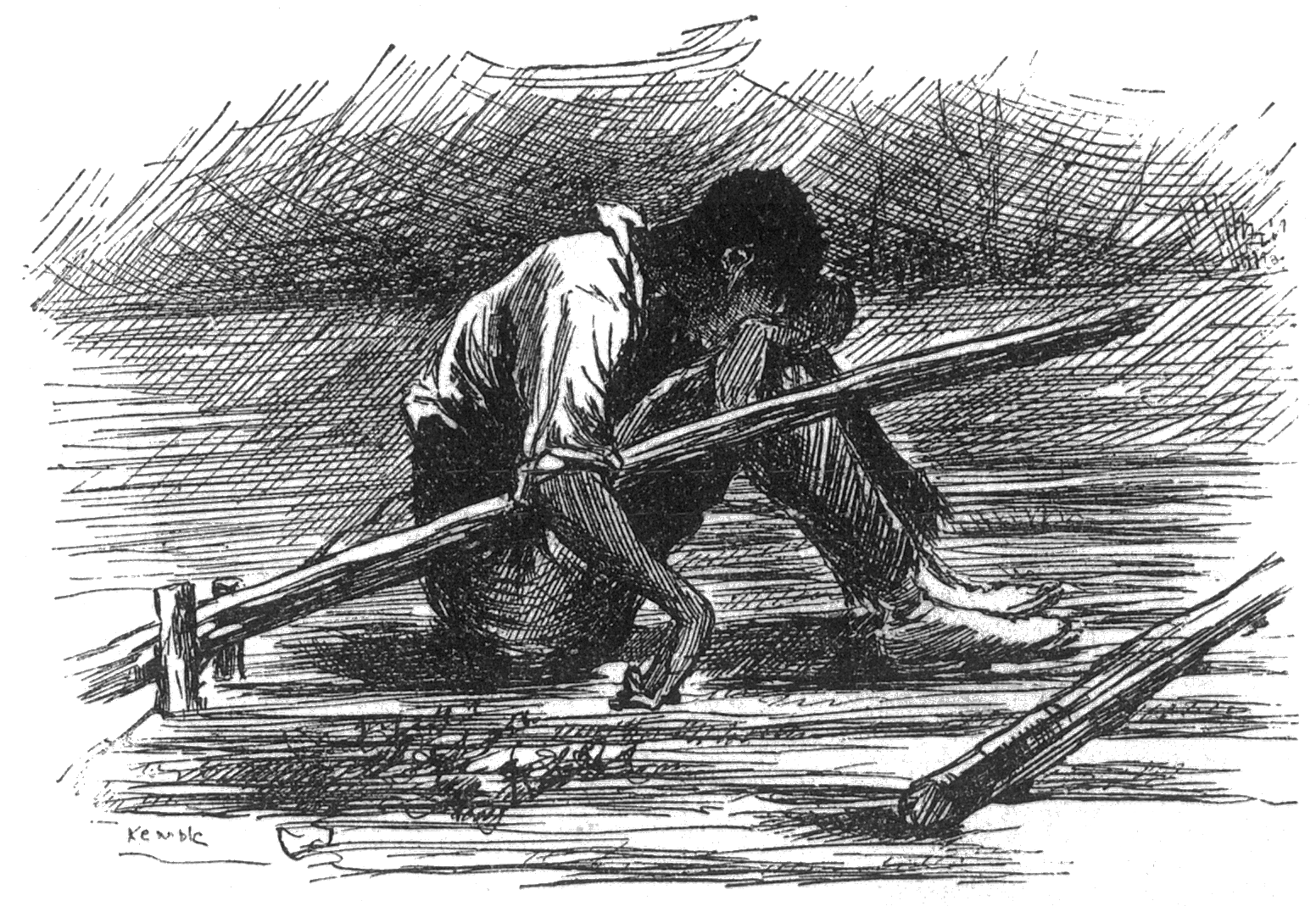
The narrative voice is James’s own, offering an intimate, first-person account of his thoughts, fears, and hopes. James is revealed to be far more educated and aware than the white characters around him realize, turning the “simple slave” trope on its head.
The relationship between James and Huck is more complex and fraught, with Huck often oblivious to the true dangers James faces. Their bond grows deeper, culminating in a major revelation about their connection near the novel’s end.
The story does not shy away from the brutality of slavery, depicting violence, loss, and the psychological toll of dehumanization.
James has been praised for its incisive commentary on race, freedom, and the legacy of slavery in America. Everett’s reimagining forces readers to confront the realities behind the mythic American river journey, centering the voice and agency of a character long relegated to the margins. The novel has been described as both a necessary reckoning and a powerful act of literary reclamation.
In James, Percival Everett offers a profound, unsettling, and ultimately redemptive vision of a classic American story. By giving James his own voice and agency, Everett revisits the past and challenges contemporary readers to reconsider the narratives we inherit and the voices we choose to hear.

James is more than a retelling of an American classic; it's a reclamation of identity and a shaming of the society that tried to erase it. Here are the reasons I highly recommend that you read James.
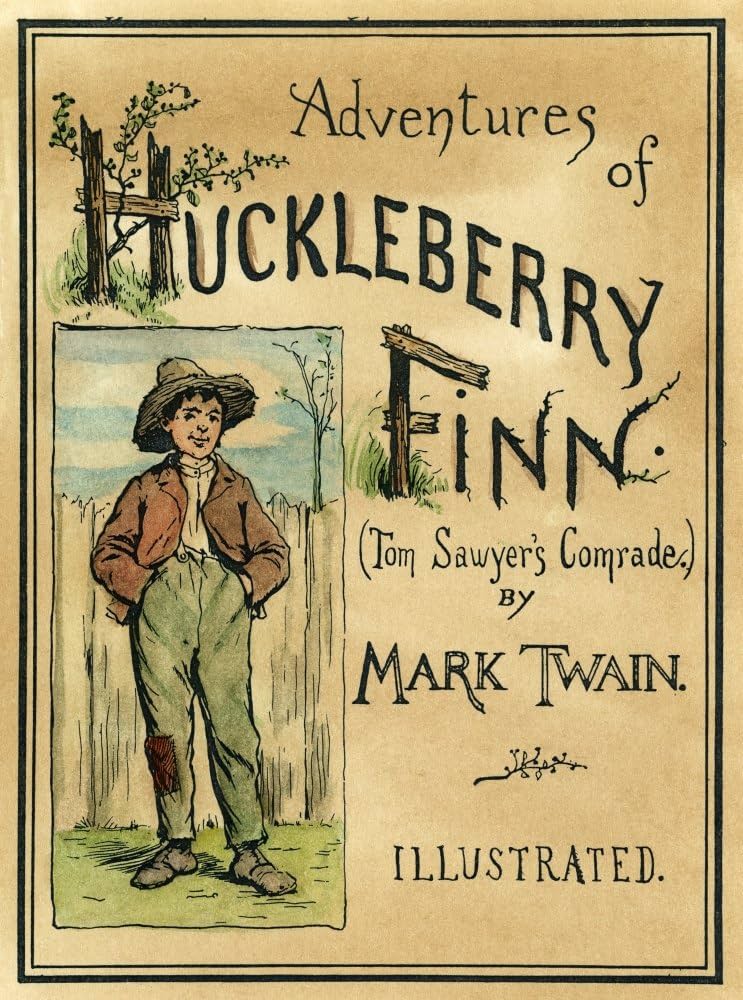
A Radical Reimagining of a Classic
James retells Mark Twain’s The Adventures of Huckleberry Finn from the perspective of Jim--here renamed James--placing the formerly sidelined enslaved character at the center of the narrative. This shift gives voice, agency, and interiority to a character long depicted through the limited lens of white narrators, offering a fresh and necessary perspective on an iconic American story.
A Deep Exploration of Race, Freedom, and Identity
Everett’s novel is a profound meditation on race, freedom, and the ongoing legacy of slavery in America. Through James’s eyes, readers experience the brutal realities of enslavement, the constant threat of violence, and the desperate yearning for family and self-determination. The book confronts the complexities of American history and challenges readers to reconsider comfortable narratives about the past.
Literary Brilliance and Emotional Depth
The prose is sharp, witty, and emotionally resonant, blending harrowing scenes with moments of humor and tenderness. Everett’s James is not just a victim of circumstance but a man of intellect, compassion, and remarkable resilience. His interior life is richly drawn, including dreamlike dialogues with Enlightenment philosophers such as Rousseau, Voltaire, and Locke, which interrogate the philosophical underpinnings of freedom and human rights.
A Story of Agency and Resistance
Unlike the original, where Jim is often passive, Everett’s James is proactive-learning to read and write in secret, risking everything to save his family, and even taking up arms when necessary. The novel does not shy away from the violence and tragedy of the era but also celebrates James’s ingenuity and determination to reclaim his story and humanity.
A Timely and Necessary Reckoning
James is not a comfortable read. It is, at times, raw but all too real. It is a reckoning with America’s past and present. The novel forces readers to confront the ongoing impact of racial injustice and to question how much has truly changed since the days of Huck and Jim’s fictional journey. It is a book that you will never forget, demanding reflection and empathy.

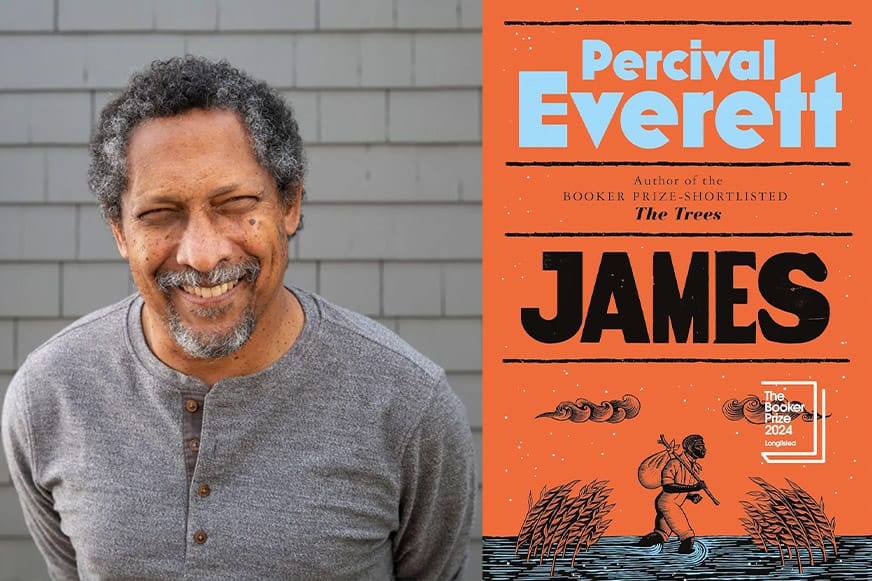
Get Percival Everett Books
This man is one of my favorite writers. He delivers at so many levels.
Bookshop.org was created as a socially conscious alternative to Amazon, with the goal of helping local, independent bookstores thrive. This is why Readers With Wrinkles supports their efforts. Please join us in this effort by purchasing your next read here.

If you enjoyed James by Percival Everett-a subversive, witty, and moving retelling of The Adventures of Huckleberry Finn from the perspective of Jim-there are several books that echo its inventive approach to classic literature, incisive social critique, and compelling storytelling. Here are some top recommendations, each with a brief explanation of how they connect to James:
Books That Reimagine or Respond to Classic Literature
- Julia by Sandra Newman: A retelling of 1984 by George Orwell, but from the perspective of Julia, Winston Smith’s love interest. Like James, this novel flips a well-known story on its head by centering a marginalized character, offering a fresh and feminist take on a classic.
- Demon Copperhead by Barbara Kingsolver: This novel reimagines Charles Dickens’s David Copperfield in contemporary Appalachia, following a boy’s struggle with poverty and resilience. Like Everett, Kingsolver uses a classic as a springboard for modern social commentary.
Novels Exploring Race, Identity, and Social Satire
- The Sellout by Paul Beatty: A biting, satirical novel that explores race and identity in America through sharp wit and complex characters, much like Everett’s approach in James.
- The Book of Night Women by Marlon James: Set on a Jamaican sugar plantation, this intense and beautifully written novel follows Lilith, a young enslaved woman, and powerfully interrogates race, violence, and resistance. It’s praised for its innovative narrative style and unflinching look at history.
- Chain Gang All Stars by Nana Kwame Adjei-Brenyah: A speculative, explosive story about a privatized prison system where inmates fight to the death for their freedom. This novel, like James, uses genre and adventure to critique American social systems and racial injustice.
Literary Fiction with Adventure or Unlikely Friendships
- Lonesome Dove by Larry McMurtry: An epic adventure across the American West, focusing on friendship, hardship, and transformation. If you loved the journey and camaraderie in James, this classic will resonate.
- The Housekeeper and the Professor by Yoko Ogawa: A gentle, moving story about the unexpected friendship between a housekeeper, her son, and a brilliant but memory-impaired math professor. If the bond between Huck and Jim was a highlight for you, this novel offers a different but equally touching exploration of connection.
Other Notable Recommendations
- The Intuitionist by Colson Whitehead: Blending speculative fiction with social commentary, this novel follows Lila Mae Watson, the first Black female elevator inspector, as she navigates a divided society. Whitehead’s inventive style and thematic complexity align well with Everett’s work.
- Beloved by Toni Morrison: A profound exploration of slavery’s legacy, told through the haunting story of Sethe, a formerly enslaved woman. Morrison’s lyrical prose and psychological depth make the book a powerful companion to James.

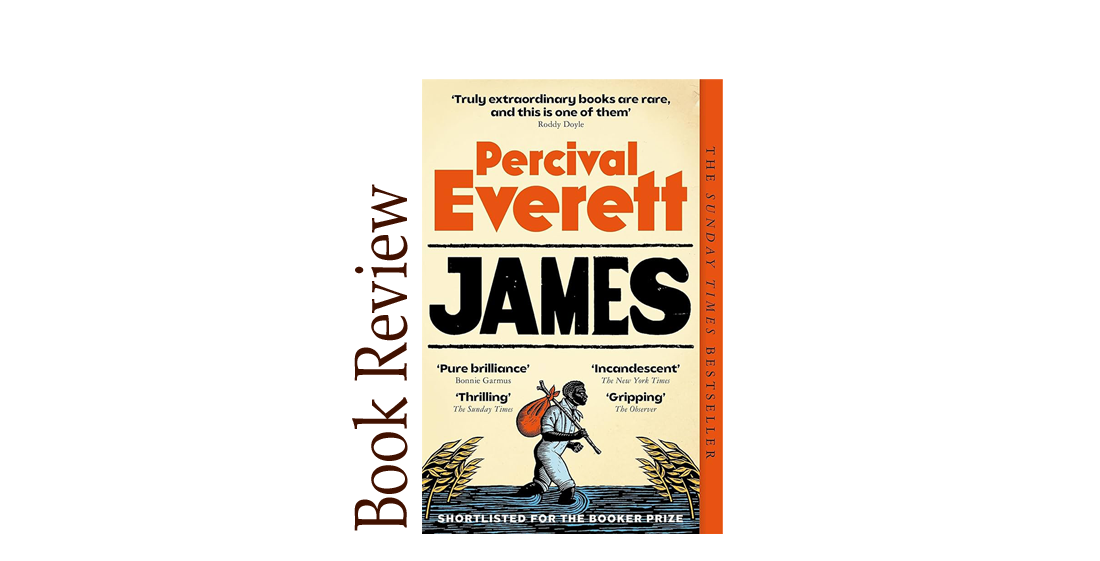
Comments